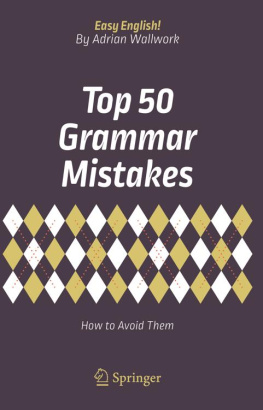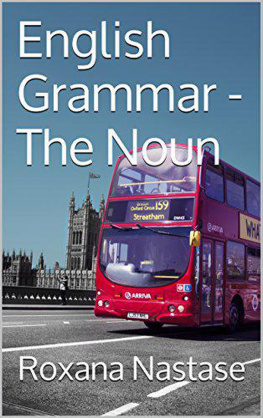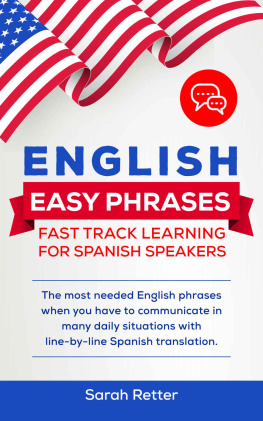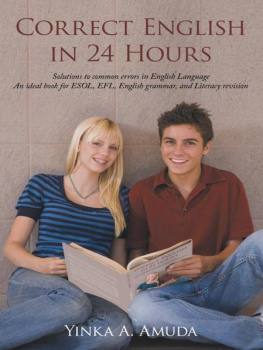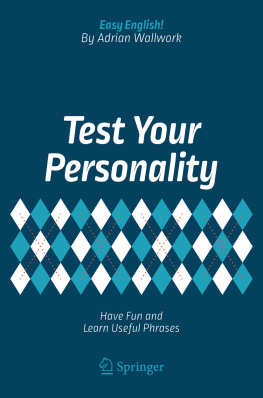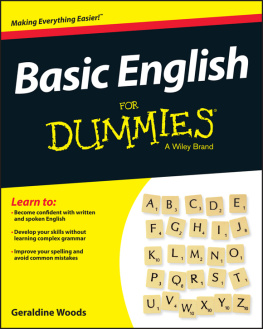Easy English!
Series Editor
Adrian Wallwork
English for Academics SAS, Pisa, Italy
Easy English is a series of books intended for students and teachers of English as a foreign language.
More information about this series at http://www.springer.com/series/15586
Adrian Wallwork
Top 50 Grammar Mistakes How to Avoid Them
Adrian Wallwork
English for Academics SAS, Pisa, Italy
ISSN 2522-8617 e-ISSN 2522-8625
Easy English!
ISBN 978-3-319-70983-3 e-ISBN 978-3-319-70984-0
https://doi.org/10.1007/978-3-319-70984-0
Library of Congress Control Number: 2017963153
Springer International Publishing AG 2018
This work is subject to copyright. All rights are reserved by the Publisher, whether the whole or part of the material is concerned, specifically the rights of translation, reprinting, reuse of illustrations, recitation, broadcasting, reproduction on microfilms or in any other physical way, and transmission or information storage and retrieval, electronic adaptation, computer software, or by similar or dissimilar methodology now known or hereafter developed.
The use of general descriptive names, registered names, trademarks, service marks, etc. in this publication does not imply, even in the absence of a specific statement, that such names are exempt from the relevant protective laws and regulations and therefore free for general use.
The publisher, the authors and the editors are safe to assume that the advice and information in this book are believed to be true and accurate at the date of publication. Neither the publisher nor the authors or the editors give a warranty, express or implied, with respect to the material contained herein or for any errors or omissions that may have been made. The publisher remains neutral with regard to jurisdictional claims in published maps and institutional affiliations.
Printed on acid-free paper
This Springer imprint is published by Springer Nature
The registered company is Springer International Publishing AG
The registered company address is: Gewerbestrasse 11, 6330 Cham, Switzerland
Students Introduction
What Is Easy English?
Easy English is a series of books to help you learn and revise your English with minimal effort.
There are two main strands of the series. You can improve your English by
doing short exercises to improve specific areas of grammar (this book) and vocabulary. The grammar and vocabulary books on focus the areas that tend to lead to the most mistakes. The aim is just to highlight what you really need rather than overwhelming you with a mass of rules, many of which may have no practical daily value
reading texts in English that you might well normally read in your own language (e.g. personality tests, jokes, lateral thinking games, word searches).
Who Is this Book for? What Level Do I Need to Be?
Anyone who is interested in eliminating the typical mistakes they make as a result of not being able to easily distinguish between similar grammatical items (e.g. the difference between the present perfect and the simple past, or between that and which).
You need to have reached a mid-intermediate level of English to benefit from this book.
Which Is the Best Format to Buy this Book in?
Paper, without any doubt. The exercises involve you writing or underlining directly onto the page. With an e-reader this would be much more difficult. However, an e-book provides a dictionary which will occasionally be useful for you.
How Many Grammar Mistakes Are Dealt with?
This book is called The Top 50 Grammar Mistakes . In reality there are several hundred mistakes dealt within the 50 chapters of Part 1 of this book. The 50 chapters are grouped by type of mistake, rather than individual mistakes.
In What Sense Is this Book an Example of Easy English?
Many books on grammar try to cover too much and appear to give equal coverage to grammatical rules irrespectively of whether these rules:
This means that you can end up doing many exercises that will not really be of much benefit to you. This is because they practise rules and examples that you are unlikely to meet in real life.
This book thus focuses on the areas of English grammar that tend to give rise to the most mistakes.
It is easy because
the typical mistakes are clearly laid out and easy to read
example sentences contain examples using common English vocabulary
the exercises are quick to do (they just involve underlining the correct answer) and they are quick to check
Of course, English can be much more complex. The good news is that the complex areas of English grammar are also those that tend to be used the least.
How Is the Book Organized?
Each chapter has a heading which gives the key words dealt with in the section. In the explanations below I will be referring to Chapter ( Much, Many, A Lot of, Lots of ).
Each chapter is made up of five subsections.
1) the first subsection shows some typical mistakes. All sentences in italics are mistakes. Each mistake is then followed in the line below with the correct version (in normal script). The key point is highlighted in bold in the correct version. Here is an example:
Was there much people?
Were there many people?
2) In the second subsection correct examples are given of the key words used in typical situations. These correct examples are shown in a box with a grey background. Here is an example:
We have a lot of information.
We do not have much information.
3) In the third subsection , very simple guidelines are given of the key words. For example:
Guidelines
much - used with uncountable nouns , generally in negative and interrogative.
many - used with plural nouns, generally in negative and interrogative
a lot of - used with all nouns, typically in the affirmative but also in the interrogative
lots of - can replace a lot of in affirmative, but is not suitable for formal situations. lots of is very rarely used in negative phrases, and is also quite rare in questions.
These guidelines are not comprehensive, they are designed to give you a quick easy-to-remember guideline to the most common uses of the particular word in question.
4) In the fourth subsection , there is an exercise which tests the key words given in the heading of the chapter, so in this case much, many, a lot of, lots of .
The exercise simply consists in underlining the correct form. In some cases, more than one form may be correct. Here is an example:
I have a lot of / lots of / many / much books on this subject.
We have a lot of homework / much homework / many homeworks to do tonight.
In question 1) a lot of, lots of and many are all possible answers, so you should underline all three. In question 2) only a lot of homework is possible.
A few of the exercises are based on exercises that can be found in English for Academic Research: Grammar Exercises (Springer), which is part of a series of books on academic English, whereas the book you are reading now is focused on general English.

